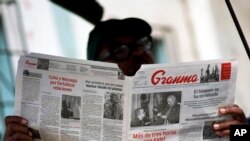A former Cuban reporter who worked for the communist government's official newspaper was featured Tuesday as the first of six journalists in the U.S. government's weeklong press freedom campaign leading up to the May 3 World Press Freedom Day.
Jose Antonio Torres was a journalist for Cuba's state newspaper Granma. He was arrested in February 2011 after Granma published his report on the mismanagement of a public works project in Santiago de Cuba, and subsequently was sentenced to 14 years in prison for allegedly spying.
"This is the kind of reporting that promotes transparency and makes a government accountable to its people," said State Department deputy spokesman Mark Toner on Tuesday, while calling on Cuban authorities to release Torres.
The State Department launched its fifth annual "Free the Press" campaign as part of its efforts to mark the importance of a free and independent media, as well as to highlight troubling trends in the persecution of journalists worldwide.
Differences in human rights practices remain a thorny issue between Washington and Havana, as the two countries continue to work on improving ties.
Days before U.S. President Barack Obama made his historic visit to the island nation in March, Granma published an editorial criticizing U.S. support for the rights of Cuban's political dissidents. It also warned against any meddling in Cuba's internal affairs, saying Washington "should abandon the pretense of fabricating an internal political opposition."
The U.S. government estimated Cuban authorities made 2,000 short-term detentions in the first three months of this year, although most long-term political prisoners have been released.
Assistant Secretary of State for Democracy, Tom Malinowski, said such detentions reflect the highly repressive tendencies of the Cuban government, as well as its nervousness about changes in relations with the U.S.
"The only argument these guys had for the last few years is the myth of American hostility toward Cuba, and we have completely destroyed that myth in the eyes of the Cuban people, and they got nothing else. And I think they're extremely nervous and insecure as a result of that," said Malinowski at a hearing of the U.S. Senate Foreign Relations Committee.




